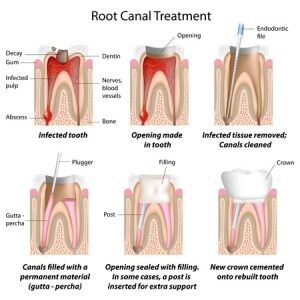
Root Canal Therapy
 Root Canal Therapy, or endodontic treatment, is a procedure whereby the pulp portion of the tooth is cleaned and replaced using specialized dental materials in order to relieve infection or pain. Generally, when the extent of caries is limited only to the enamel or dentine, fillings are advised to restore the tooth. However, when the infection spreads to the level of the pulp, fillings alone cannot treat the condition and in such cases, Root Canal Therapies are indicated.
Root Canal Therapy, or endodontic treatment, is a procedure whereby the pulp portion of the tooth is cleaned and replaced using specialized dental materials in order to relieve infection or pain. Generally, when the extent of caries is limited only to the enamel or dentine, fillings are advised to restore the tooth. However, when the infection spreads to the level of the pulp, fillings alone cannot treat the condition and in such cases, Root Canal Therapies are indicated.
The most common symptom that indicates infection spread to the pulp is sharp, excruciating pain which may or may not get relieved by painkillers, and can radiate to the head, jaw or temple region. Patients also complain that the pain aggravates at night-time and renders them incapable of eating or sleeping properly. Even though this history is adequate for diagnosing irreversible pulpitis, and for planning a Root Canal Therapy, specialized X-rays known as periapical radiographs are taken in order to assess the extent and degree of infection. Periapical radiographs play a critical role in the success of an endodontic treatment.
The procedure involves administration of local anesthesia in order to numb the affected tooth. The dental surgeon then clears the caries and opens an access to the pulp chambers, or canals of the tooth using a mechanical hand-piece fitted with high speed burs. Once the access has been gained, endodontic instruments known as H and K files are used to clean the canal and remove all infected pulp, bacteria and debris. After careful cleaning and shaping, the canals are dried with the help of Paper Points and are then filled using Gutta Percha points. Gutta Percha is a biocompatible, non-toxic and inert material that effectively replaces the pulp portion of the tooth. Contrary to the common misconception, Root Canal Therapies are generally painless; dentists apply topical anesthesia prior to numbing the region to reduce the discomfort caused by a needle prick. Once the local anesthesia has been successfully administered, the patient can no longer feel any pain during any phase of the procedure.
A natural tooth that has been damaged by caries can easily be saved with Root Canal Therapy; if left untreated however, the infection can spread to an extent where the tooth can no longer be saved and must then be extracted from the arch. Following Root Canal procedures, teeth are covered with porcelain/porcelain-fused-to-metal crowns to restore structural integrity, function, aesthetics, and to prevent further damage.
Are you concerned about the health and vitality of a particular tooth with a carious lesion? Book an appointment with George Turner DDS to experience dental services at their very best!
Contact
